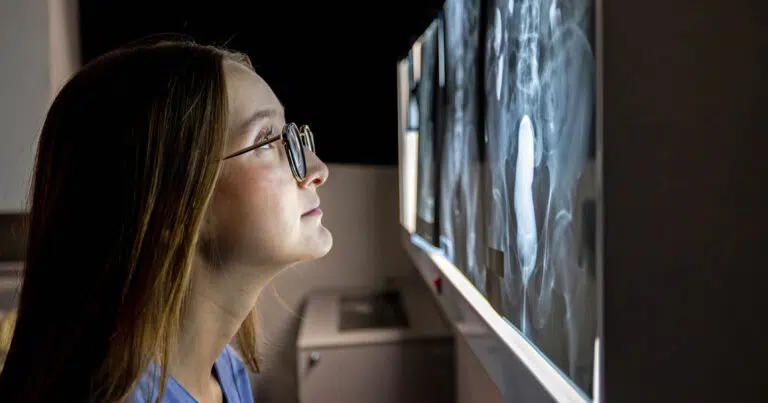Radiology Technician Salary Guide
Whether you just graduated from a radiography program or you’re an experienced radiology technician looking to increase your earnings, it’s essential to understand the factors determining your pay. Education and experience are two top considerations regarding radiology technician salary, but you should also explore how location, employer choice and certification can affect your earning potential.
This guide breaks down the average radiology technician salary in several states and compares salaries for similar allied health roles. You also get tips to increase your compensation as you build a rewarding career.
Average Radiology Technician Salary
$37.92/hour
The average salary for a Radiology Technician is $37.92 per hour. This is 9% lower than the practicing US average of $41.29.
Last updated on January 3, 2025. Based on active jobs on Vivian.com.
Salaries for Radiology Technician compared to Allied Health Professional National Averages
$37.92/hour
9% lower than the practicing US average.
$41.29/hour
United States
What are the highest paying Employers and Agencies for Radiology Technician jobs?
| Average Hourly Salary | Max Hourly Salary | |
|---|---|---|
| Montefiore Medical Center | $46 | $52 |
| Kaiser Permanente | $42 | $42 |
| Core Medical-Perm | $32 | $36 |
| UCHealth (Colorado) | $32 | $34 |
| Mass General Brigham | $32 | $32 |
| LanceSoft - QIA | $31 | $31 |
| Stability Direct | $29 | $29 |
| MedQuest | $29 | $29 |
| BJC HealthCare | $28 | $28 |
| Palm Health Resources | $28 | $28 |
Last updated on January 3, 2025. Information based on active jobs on Vivian.com and pay data from BLS and around the web.

Radiology Technician Career Guide
Use our exclusive Career Guides to research the education, qualifications, skills and responsibilities for a variety of healthcare disciplines and specialties employers are hiring now.
Go to the guideTop Radiology Technician Jobs
Radiology Technician
- Kaiser Permanente
- Richmond, CA
- 0x8 hrs, Days
Radiology Technician
- Healthcare Support Permanent Placement
- Gainesville, FL
- 3x12 hrs
- Sign-On Bonus
Radiology Technician
- Healthcare Support Permanent Placement
- Orlando, FL
- 5x8 hrs
- Sign-On Bonus
Radiology Technician
- Healthcare Support Permanent Placement
- Ocala, FL
- 3x12 hrs
- Sign-On Bonus
Get alerts about new jobs and salary trends
Be the first to know about new jobs for Radiology Technicians with the salary that suits you.
Ways to Increase Your Pay as a Radiology Technician
The more experience you have on the job, the higher your earning potential. However, those wanting to kick their salary up a notch in less time have a few options.
Get Certified
Healthcare employers often pay a premium for employees who go above and beyond the minimum job requirements. Therefore, taking the initiative to earn professional certification may help you qualify for higher-paying jobs and opportunities for career advancement. One of the most common options for radiology technicians is the American Registry of Radiologic Technologists (ARRT) Radiography Registered Technologist R.T.(R)(ARRT) certification. To obtain this credential, you need to complete three steps.
Educational Requirements
The first step is to complete an associate degree or higher at an ARRT-approved educational program. Your degree must be in the same ARRT credential you’re pursuing. Thus, if you want the R.T.(R)(ARRT) certification, you must complete a radiography degree that includes all didactic and clinical competency requirements.
Ethical Requirements
The second step is meeting ARRT’s ethics requirements. When you apply for the R.T.(R)(ARRT) credential, you must answer several questions about your criminal history and disclose whether you have any charges or convictions, including:
Guilty pleas
Traffic violations involving drugs or alcohol
Traffic violations charged as misdemeanors or felonies
Convictions with suspended sentences and pleas of no contest
You must also disclose whether you’ve ever had a professional license, certification, registration or permit suspended, revoked or denied. Disclosures must include being placed on probation or subjected to any disciplinary actions.
Exam Requirements
The third step is to take the ARRT certification exam. This computer-based exam has 200 scored questions covering the following content categories:
Patient Care (33 questions)
Patient Interactions and Management
Image Production (51 questions)
Image Acquisition and Evaluation
Equipment Operation and Quality Assurance
Safety (50 questions)
Radiation Protection
Radiation Physics/Radiobiology
Procedures (66 questions)
Extremity
Thorax and Abdomen
Head, Spine and Pelvis
Work in Underserved Areas
Medically underserved areas of the country receive the medically underserved area (MUA) classification because they meet at least one of the following criteria:
High poverty rate
Large number of elderly residents
High infant mortality rate
Shortage of primary care providers
California, Texas and Illinois have the highest number of MUA designations in the country. It’s often difficult to entice medical professionals to MUAs, so if you’re willing to move to one of these areas or take on a travel job for several months in an MUA, you may qualify for higher starting pay and additional benefits.
Accept Travel Jobs
In the healthcare industry, travel jobs often pay more than staff positions. You may even receive tax-free housing stipends to help cover the costs of staying in a different location while fulfilling your travel contract if you can claim a permanent tax home. By completing one long contract or several short contracts each year, it’s possible to increase your pay substantially.
As previously noted, Vivian’s salary date during the first week of December 2022 showed an average hourly salary of $35.44 for perm staff radiology technicians in California. Fortravel radiology technician roles, the average weekly salary jumps to $3,244 per week or about $81.10 per hour in a 40-hour workweek. Travel radiology technicians in Texas earned $2,628 per week, or about $65.70 hourly, compared to an average of $27.71 per hour for staff roles.
Though Florida tends to have lower average salaries than Texas and California, accepting a travel radiology technician job in the Sunshine State can be lucrative. Radiology technician jobs in Florida paid an average of $62, compared to the hourly $26.65 rate for staff technicians.
Featured Blog Posts
Featured Blog Posts


